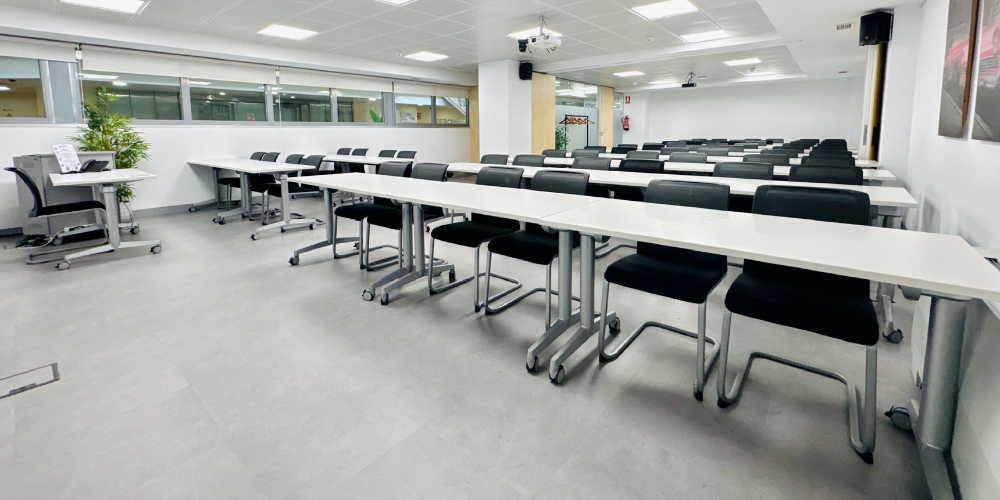In an increasingly competitive world, where technical knowledge is no longer the only passport to business success, the art of “Networking” has become the compass that guides us to unsuspected opportunities. But have you ever wondered where the epicenter of this crucial activity is? It’s not at fancy seminars, or exclusive cocktail parties; it’s, closer than you think, at a Business Center.
Imagine it as an ecosystem, an oasis of possibilities where entrepreneurs, freelancers and business people congregate not only to conduct their day-to-day operations, but also to weave that invaluable network of contacts that could catapult their business to the next level. It is the perfect environment to develop the networking skills that are so vital in our times.
In this article, we’ll unravel the mysteries of networking, offer proven tips for strengthening your network, and reveal why a Coworking space is not just a physical space, but a catalyst for success. Get ready to embark on a journey that could change the way you view your career and your business forever.

What is networking?
Simply put, networking is the act of establishing and cultivating professional relationships with the goal of creating a network of contacts that can be beneficial to your career or business. But let’s go beyond the dictionary; networking is a delicate dance of human interaction, a choreography of words and gestures where every step has its meaning, every glance its intention.
It’s not just about exchanging business cards or adding connections on LinkedIn. It is an art and a science that combines communication skills, empathy, and strategy to achieve specific objectives. It could be finding a new job, attracting customers, forming strategic alliances or even getting investment for your venture.
The Pillars of Networking
- Genuine Interest: It is essential that you show a real interest in the other person. The strongest and longest lasting relationships are based on mutual understanding and the value that both parties can bring to the table.
- Reciprocity: In the world of networking, giving and receiving go hand in hand. You cannot expect to benefit from your network if you are not willing to offer something in return, be it your time, your knowledge or your resources.
- Consistency: Like any other skill, networking requires constant practice. This is not a one-time event, but an ongoing process of cultivating relationships and staying in touch.
- Quality over Quantity: Although it may seem tempting to amass a large number of contacts, it is more profitable to focus on the quality of the relationships. A handful of well-cultivated connections is often more beneficial than an extensive but superficial network.
The Basic Elements of Networking
Mastering the art of networking is similar to learning a new language: it has its own grammar, its own nuances and, of course, its own basic elements that you must understand in order to communicate fluently. Here we break down the fundamental pillars that form the basis of effective networking.
Preparation
Before attending any event or participating in activities where you plan to network, it is crucial that you prepare yourself. Research the people or companies that will be present, know their background and have a clear idea of what you want to achieve with each interaction. This strategic approach positions you as knowledgeable and serious about your objectives.
First Contact and Personal Presentation
The first impression is crucial. From your handshake to your appearance to the way you speak, everything communicates a message about who you are. Your personal presentation should be a blend of professionalism and approachability, which creates a positive first impression that opens doors for future conversations.
Active Listening
Networking is not just about talking about yourself and your accomplishments; in fact, one of the most underrated skills is active listening. By showing genuine interest and asking questions that invite dialogue, you not only gather valuable information, but you also make the other person feel valued, which is crucial to building meaningful relationships.
Continuous Interaction
Networking doesn’t end when the lights go out at the event or when you close your office door at the Business Center. Maintaining contact is vital to nurturing the relationships you have formed. A simple thank you message or an occasional follow-up can make the difference between a forgotten contact and a lasting relationship.
Value Contribution
For people to want to be part of your network, you must offer something that is of value to them. It can be your expertise in a particular subject, your skills in a specific field or even your connection with other professionals. When you provide value, people are more willing to invest time and resources in the relationship.
Network Management
Once your network starts to grow, its management becomes equally important. Tools such as LinkedIn, address books and contact management applications can help you keep track of your connections, their details and the interactions you’ve had, which is vital for effective long-term networking.
Evaluation and Adjustment
Like any strategy, it is important to periodically evaluate the effectiveness of your networking efforts. This allows you to make adjustments in your approach, improve your skills and focus on the areas that offer the greatest return on investment in both time and resources.
Mastering these networking basics will equip you with the tools you need to navigate the complex but rewarding world of professional relationships. And in a coworking space you will have the perfect environment to put these principles into practice and see them materialize into opportunities and growth.
Common Networking Mistakes
Networking can be the master key that opens doors to new opportunities, but it can also be a double-edged sword if not done correctly. Here we identify some of the most common mistakes people make when trying to expand their network, especially in environments as conducive as Business Centers.
- Lack of Preparation: Going to a networking event or even spending a day at a Business Center without a clear plan is like navigating without a map. Lack of preparation can lead you to miss valuable opportunities simply because you didn’t know what you were looking for or how to present yourself effectively.
- Selfish Approach: One of the most common mistakes is to approach networking with an exclusively self-centered mindset: What can I get from this person? This approach is often counterproductive. Effective networking is based on the mutual exchange of value. You must be willing to offer something before you expect to receive something in return.
- Ignoring the Power of First Impression: In both physical appearance and behavior, first impressions are vital. A limp handshake, a sloppy appearance or even the lack of a smile can send the wrong message and hinder your chances of creating meaningful connections.
- Not Listening: Talking too much and listening too little is a classic mistake. By dominating the conversation, you not only miss out on getting to know the other person, but you may also come across as self-centered or disinterested, which closes doors instead of opening them.
- Neglect Follow-up: Networking doesn’t end when the event ends or when you leave your office. Not keeping in touch with the people you have met is like planting a seed and then ignoring it, hoping that it will somehow grow on its own.
- Do not Personalize the Contact: In the digital age, it is easy to send generic messages to a large number of contacts. However, lack of customization can be counterproductive. People like to feel that they are more than just a name on a contact list.
- Superficiality in Relationships: Seeks to build meaningful relationships rather than simply accumulate business cards. A large but superficial network of contacts will rarely offer you the same value as a smaller, but highly committed group of contacts with whom you have actually built a relationship.
- Failure to Maintain and Update the Network: Networks are not static; they require constant maintenance and updating. Ignoring your network after it has been established is not only a waste of initial effort, but can also lead to missed opportunities in the future.
Networking in flexible office spaces, the secret to exponential growth
When we talk about Business Centers or Flexoffice, many may think of them simply as physical spaces equipped with the technology and amenities necessary to carry out our workday. However, these centers are much more than that; they are epicenters of opportunity, launching pads for professional relationships and authentic networking laboratories.
Below, we explore the advantages that make networking in Coworking spaces an invaluable strategy for any professional aspiring to success.
Variety and Diversity of Professionals
Diversity is one of the first advantages that come to the fore. A Business Center brings together professionals from diverse sectors, levels of experience and areas of expertise. This melting pot of talent offers a unique panorama to discover unsuspected collaborations, learn from other fields and, of course, to expand your network in an enriching way.
Specialized Events and Activities
From lectures and seminars to cocktail parties and trade shows, Business Centers often offer a range of activities that are not only educational, but designed to encourage networking. These activities provide you with the perfect setting to meet people who already have a common interest with you, thus facilitating genuine connections.
Professional Environment and Credibility
Simply being associated with a well-established Coworking space can raise your professional profile. This type of environment exudes seriousness and commitment, qualities that are transferred almost automatically to you or your business when you are in such a space. This additional credibility makes you and your services more attractive to other professionals.
Collaboration Opportunities Around the Corner
One of the most exciting aspects of networking in Business Centers is the immediacy of the opportunities for collaboration. Maybe you’re looking for a digital marketing specialist and there happens to be one working in the office next door. Or maybe you have an idea for a project, but need a graphic designer; chances are you’ll find one on your floor. The possibilities are virtually endless.
Synergies and Creativity
Close contact with other professionals generates an environment of synergy and creativity that is difficult to replicate in other environments. Casual conversations in common areas or during breaks can turn into real brainstorming sessions, generating ideas and solutions that you might not have found while working in isolation.
Time and Resource Savings
Effective networking often requires a considerable investment of time and resources. However, in flexible office spaces, networking opportunities are integrated into your daily work environment. This eliminates the need to travel to external events or to organize specific meetings, allowing you to optimize your time while benefiting from the advantages of networking.
Conclusion: Business Centers, Much More Than Workspaces
In short, Business Centers or Coworking spaces are true incubators of professional success, and one of their most outstanding advantages is the powerful networking ecosystem they offer. They are not only spaces designed for individual work, but are dynamic environments that catalyze the creation and strengthening of networks, becoming a key element for any professional who aspires to grow and excel in their field.
In these centers, networking is lived in every corner: from the morning coffee to the specialized events, to the spontaneous conversations that arise in the common areas. It is a practice that integrates naturally into your daily life, enhancing both your professional and personal development.
We have also identified some common mistakes that are often made when networking, but the good news is that these can easily be avoided with a little preparation and a focus on the quality rather than the quantity of the relationships you forge. At IBERCENTER you have at your disposal all the tools you need to avoid these pitfalls: a diverse and vibrant community, an environment that inspires professionalism and a range of events that encourage interaction and continuous learning.
Therefore, we can say with certainty that if you are looking for an environment that maximizes your effective networking opportunities, Business Centers are not just an option, they are THE OPTION. Here you will find more than just a desk and a chair; you will find a world of possibilities that unfold with every encounter, every conversation and every new contact. Don’t underestimate the power of where you choose to work; it can, in fact, determine the course of your professional future.
Flexible offices in Madrid Ibercenter



